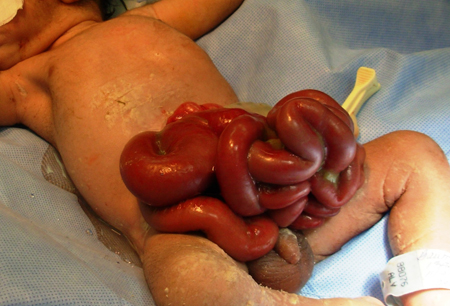Resumo
Definição
História e exame físico
Principais fatores diagnósticos
- presença de fatores de risco
- idade materna <20 anos (gastrosquise)
- idade materna >35 anos (onfalocele)
- alfafetoproteína sérica materna elevada (gastrosquise)
- ultrassonografia pré-natal positiva
- anomalias cromossômicas fetais (onfalocele)
- conteúdo abdominal externo à parede abdominal
Fatores de risco
- idade materna <20 anos (gastrosquise)
- sexo masculino do neonato (gastrosquise)
- idade materna >35 anos (onfalocele)
- tabagismo
- infecção materna durante a gestação
Investigações diagnósticas
Primeiras investigações a serem solicitadas
- diagnóstico clínico
Algoritmo de tratamento
gastrosquise
onfalocele
Colaboradores
Autores
Cynthia L. Leaphart, BA, BS, MD

Patient Safety
University of Florida College of Medicine
Jacksonville
FL
Declarações
CLL declares that she has no competing interests.
Agradecimentos
Dr Cynthia L. Leaphart would like to gratefully acknowledge Dr Joseph T. Tepas, a previous contributor to this topic.
Declarações
JTT declared that he had no competing interests.
Revisores
Lewis Spitz, MBChB, PhD, FRCS, MD, FRCPCH, FAAP, FCS
Emeritus Nuffield Professor of Paediatric Surgery
Institute of Child Health
University College
London
UK
Declarações
LS declares that he has no competing interests.
Fizan Abdullah, MD, PhD
Assistant Professor of Surgery
Division of Pediatric Surgery
Johns Hopkins University School of Medicine
Baltimore
MD
Declarações
FA declares that he has no competing interests.
Ruth Hallows, BSc, MB BS, FRCS, FRCS III (Pediatric Surgery)
Consultant in Paediatric and Neonatal Surgery
Royal Alexandra Children's Hospital
Brighton
UK
Declarações
RH declares that she has no competing interests.
Shilpi Chabra, MD
Assistant Professor
Department of Pediatrics
University of Washington Medical Center
Seattle
WA
Declarações
SC declares that he has no competing interests.
Créditos aos pareceristas
Os tópicos do BMJ Best Practice são constantemente atualizados, seguindo os desenvolvimentos das evidências e das diretrizes. Os pareceristas aqui listados revisaram o conteúdo pelo menos uma vez durante a história do tópico.
Declarações
As afiliações e declarações dos pareceristas referem--se ao momento da revisão.
Referências
Principais artigos
Torfs CP, Velie EM, Oechsli FW, et al. A population-based study of gastroschisis: demographic, pregnancy, and lifestyle risk factors. Teratology. 1994 Jul;50(1):44-53. Resumo
Langer JC, Harrison MR, Adzick NS, et al. Perinatal management of the fetus with an abdominal wall defect. Fetal Ther. 1987;2(4):216-21. Resumo
Glick PL, Harrison MR, Adzick NS, et al. The missing link in the pathogenesis of gastroschisis. J Pediatr Surg. 1985;20:406-9. Resumo
Snyder CL. Current management of umbilical abnormalities and related anomalies. Semin Pediatr Surg. 2007 Feb;16(1):41-9. Resumo
Sipes SL, Weiner CP, Sipes DR 2nd, et al. Gastroschisis and omphalocele: does either antenatal diagnosis or route of delivery make a difference in perinatal outcome? Obstet Gynecol. 1990 Aug;76(2):195-9. Resumo
Artigos de referência
Uma lista completa das fontes referenciadas neste tópico está disponível para os usuários com acesso total ao BMJ Best Practice.

Diagnósticos diferenciais
- Extrofia da cloaca
Mais Diagnósticos diferenciaisDiretrizes
- Gastroschisis
- Gastroschisis: management prior to transfer to surgical centre
Mais DiretrizesConectar-se ou assinar para acessar todo o BMJ Best Practice
O uso deste conteúdo está sujeito ao nosso aviso legal